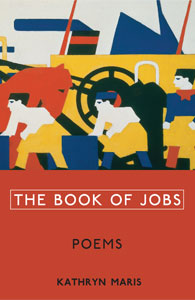
paper • 49 pages • 14.95
ISBN-10: 1-884800-71-8
THE END OF ENVY
The end of envy
Is a staircase in midair.
From there,
There is nothing to want,
But there is wind to love.
I miss what the wind bent,
But I’m used to the bare world.
When I was sentenced to the stairs
For eternity, I didn’t know
I would climb them pregnant,
Or ill, or with the aim of soothing a cry
That would reappear
As soon as I was at the bottom.
In a way I am happy here on the stairs,
For the end of envy
Is the end of desire, the end of the edifice,
But not of elevation.
“Maris’ first outing explores not suffering (as in the Biblical Job) but occupations: vocations, professions, trades, ways to work for a living, and the nature of works of art. Her verbal flourishes fit the topic well: ‘What is work anyway,’ she asks, ‘but a turgid mirror// whose revelations quiver/ in recalculation?’…Her urbane language keeps its center in Manhattan, with side trips to the Netherlands, Greece, Italy, Brazil: the poet also depicts museums and the family home, where she becomes ‘mother to all that is bare, all that is gone’… Maris’ verse has the feel of charcoal sketches, well-defined and rapidly executed, with blank space where the perceiver’s eye can take hold. ” –Publishers Weekly Copyright © Reed Business Information, a division of Reed Elsevier Inc. All rights reserved.
“That Kathryn Maris has written a first book that feels as assured as other poets’ third or fourth books; that she writes with wit, grace, and heart in a beautifully spare style capable of effects at once lush and harsh, sorrowful and satiric, passionately felt and contemplatively calm, reveals a poet of highly original understanding who feels ‘The beating of now, the caesura of tomorrow / That I hear in the day, in the dark, in fear.’ But even more impressive than these gifts is the idiosyncrasy of her perceptions: like Cavafy, she stands at a slight angle to the universe, as in these lines from ‘Greek Funeral’: ‘The vertical line that is Grandmother standing on her grave-to-be./ My mind extends the line to infinity. There she is: in the clouds and in the ground.’ The subtle strangeness of seeing her grandmother fuse with the horizon line, and the visionary impulse to extend that line to infinity, plus the naturalness and subtle musicality of her idiom, demonstrates this poet’s great formal accomplishment and uniquely powerful sensibility.” —Tom Sleigh
“Between ‘the beating of now’ and ‘the caesura of tomorrow’ lies possibility: realm of Hope, realm of Fear. With nimble intellect and a vision at once acerbic, compassionate, ever-original, Kathryn Maris gives resonant voice to the faceless many who have been variously broken by loss and indifference in a world that justifies paranoia and is also a catalyst for a wry, tragicomic wisdom. ‘No loss is mine, for there is no me,’ says one of the many anonymous witnesses here—witnesses to their own undoing and to that of the anonymous others around them. The Book of Jobs is the moving and increasingly persuasive testimony to that collective vision.” —Carl Phillips